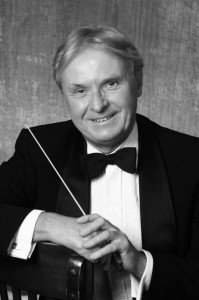Brian Jackson has been conducting orchestras for over half a century. The British-Canadian conductor, organist, and pianist has conducted since he was a teenager in the 1950s. And when the Canadian College of Performing Arts teams up with the Victoria Symphony for their upcoming Broadway Spectacular, it will celebrate Jackson’s retirement.
Born in Cornwall—the southwestern-most point in England—in 1943, Jackson arrived to a family devoid of musicians.
“Since there was no one musical in the family they didn’t know what they were dealing with,” he says with a laugh. “Growing up in Cornwall was pretty isolated. I suppose in Canada it would be like being born in Newfoundland.”
Jackson was performing as a concert pianist by the age of six. By 12 he was performing as an organist, and in his teens he began conducting. This talent earned him a scholarship for Oxford in the 1960s, where he completed a master’s degree in music in 1968 while working as a producer at the BBC. At a young age, Jackson had already accomplished so much, something he feels he took for granted.

“I think I went to university too young,” he says. “I’d won the scholarship when I was 16, and at 17 I was there. I was very lucky. It was an incredible experience but I was too young to appreciate it.”
Since then, Jackson has conducted across North America and Europe. And during his extensive career, he’s come up with a unique perspective on his job.
“A conductor is really like a glorified traffic cop,” he says. “You really only need to look at a junction. It’s what I call traffic flow, controlling the traffic. It’s all done at rehearsal, really, and at the performance I think you just let them go and play.”
Dealing with the personalities of a big orchestra can be something of a challenge, depending on the style of approach a conductor chooses to take. Jackson says it can be very easy for conductors to become megalomaniacs.
“There are two ways of leading an orchestra: the first is with a stick, which you hit them over the heads with,” he says. “I tend to lead with a carrot, so you are educating—you bring it out of the person, you don’t beat it out of them.”
Jackson believes that the conductor is like a referee for the composer, advocating on their behalf to make sure that the music is heard the way the composer originally intended.
“Someone has to be in charge,” he says. “If you let everyone have a say in a 100-piece orchestra, you have total anarchy. But that doesn’t mean that the conductor has to be a dictator.”
Despite the challenges of conducting, Jackson has an obvious love for the career he has dedicated the better part of a century towards.
“Nothing will ever beat live performance,” says Jackson. “It’s more than just an aural experience, it’s a visual thing, it’s a collective energy level that comes off the stage and hits an audience.”
Broadway Spectacular
8 pm Friday, March 30, 8 pm Saturday, March 31, 2 pm Sunday, April 1
Royal Theatre, $33
victoriasymphony.ca

